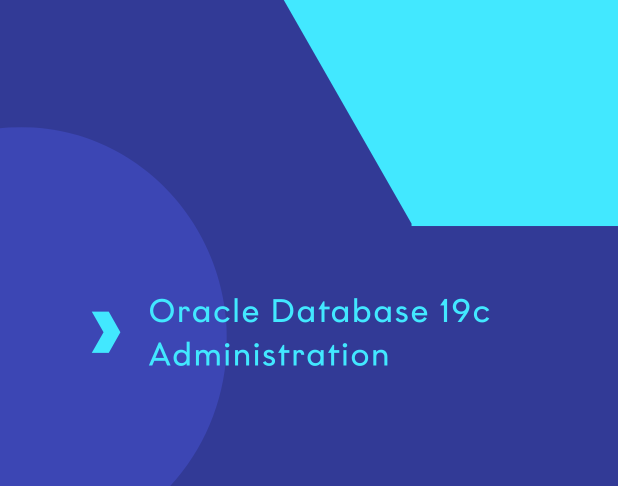Whether you’re aiming to enhance your capabilities as a database administrator or ensure smooth and secure database operations within your organisation, the course helps you build confidence, stay up to date with the latest Oracle technologies, and deliver greater value in your role.
March sale - up to 50% off training courses – use code: EARLY0326USA
Oracle Database 19c Administration
Select your learning method

Build strong, practical Oracle DBA skills
Build real-world DBA skills with this Oracle Database 19c Administration course. You’ll work with Oracle tools in live labs, tackling common administration tasks and learning how to handle performance, storage, users and backups effectively.
- Administer Oracle databases
- Configure connectivity and listeners
- Optimise performance
- Manage storage structures
- Handle users and roles
- Automate jobs
- Enable auditing features
- Set up backup and recovery plans
What you’ll learn
Develop the ability to manage and support an Oracle database environment effectively. The course covers essential areas including database architecture, user and role management, configuring storage, and securing access to data. You’ll also learn to set up and manage network connectivity using Oracle Net Services.
Network configuration
Learn how to set up Oracle Net Listener, use naming methods, and test connections using tools like TNSPING and Net Manager. The course covers common connection issues and how to fix them, so you can feel confident managing access to your Oracle 19c database. By the end, you’ll know how to keep your database running smoothly and avoid connectivity errors.
User and privilege management
As a DBA, controlling user access is one of your most important responsibilities. This course teaches you how to set up user accounts, assign roles, and grant or revoke privileges in line with best practices. You’ll learn how to manage authentication, create secure profiles and keep your Oracle 19c database organised and compliant. The training also covers monitoring user activity and helps you understand the security impact of privilege changes, whether you're managing a handful of users or a whole team.
Job scheduling
Oracle’s job scheduling tools help database administrators avoid repetitive tasks by automating them. You’ll learn how to set up jobs that run automatically, whether that’s backups, clean-ups or reports. We’ll cover how to use time-based schedules, set up event triggers and group jobs into classes. All of which helps you save time, maintain consistency, and keep your Oracle 19c database running efficiently without manual input.
- 5 days of instructor-led training in a live virtual classroom
- Interactive hands-on live labs
- All relevant course materials
Key facts
DBAs and others working with Oracle databases who want to enhance their administration skills.
You should have a basic knowledge of databases and Oracle SQL. Plus, some prior experience with Linux or PL/SQL would be beneficial.
Our experienced trainers and interactive labs create a focused, practical environment – so you can put theory into practice from day one.
FAQs
This course walks you through the key responsibilities of a database administrator using Oracle 19c. You’ll gain hands-on experience in setup, monitoring, security, and more.
How do I manage users, roles and privileges in Oracle 19c?
In Oracle 19c, user, role, and privilege management is handled using tools like SQL Developer or SQL commands such as create user and grant. You can assign system and object privileges directly to users or group them into roles for easier management. Roles streamline permission control, especially across multiple users. Additionally, profiles can be applied to enforce password policies and resource limits, helping you to secure and optimise database access.
Will I learn how to monitor and improve database performance?
Yes, performance is a key focus of this course. You will learn how to identify bottlenecks, monitor database activity using Oracle tools, and understand the core processes that will impact performance. The course covers performance metrics, tuning techniques, and preventative checks to help maintain efficiency. Through practical exercises, you’ll apply these techniques in simulated environments, developing the skills needed to diagnose and resolve issues effectively in a working database setting.
Can this course help me if I’m working with alternative versions of Oracle?
While the focus is on Oracle 19c, the core admin tasks and tools you’ll use apply across earlier versions like 12c and 18c too. Our trainers can explain how things differ and how to apply the same action in other versions, so you’re prepared for workplace application, whatever version your organisation uses.
Alternatively, we also offer a range of courses in Oracle 12cR2 and 18c which will offer more targeted training.
What our customers say

"I really enjoyed this course, it was clear the instructor had in-depth knowledge about the subject and was keen on answering questions and explaining problems thoroughly. I also appreciated learning about the principles, best practice standards, and the reasoning behind these."

"Always good courses from ILX. Tutor explained the course very well."
Join the half a million learners developing their skills with our training
A trusted partner to thousands of organisations worldwide
Our passionate team goes above and beyond to support customer needs
Please complete the form to ensure your quote is accurate and we will contact you soon.